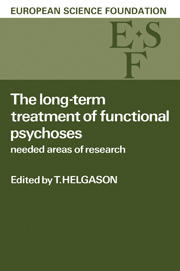Book contents
- Frontmatter
- Contents
- List of Participants
- Introduction
- I Organisational Aspects of Long-term Treatment
- II Patients Aspects of Long-term Treatment
- Needed are as of research in psychological treatments for functional psychoses
- Family therapy as part of the treatment of schizophrenia
- Milieu therapy in the long-term treatment offunctional psychoses: needed areas of research
- Long-term treatment of functional psychosis with neuroleptics
- Lithium and prophylaxis in manic-depressive illness
- New perspectives in psychopharmacology
- Research implications of recent trends in the treatment of schizophrenia
- Long-term treatment of functional psychoses in childhood and adolescence
- Functional psychosis in old age
- Chronicity and hospitalization: can the viciouscirclesbe broken?
- Social network and the long-term course of mental disorders - research needs
- III Public Health Aspectsof Long-term Treatment
- Index
Research implications of recent trends in the treatment of schizophrenia
from II - Patients Aspects of Long-term Treatment
- Frontmatter
- Contents
- List of Participants
- Introduction
- I Organisational Aspects of Long-term Treatment
- II Patients Aspects of Long-term Treatment
- Needed are as of research in psychological treatments for functional psychoses
- Family therapy as part of the treatment of schizophrenia
- Milieu therapy in the long-term treatment offunctional psychoses: needed areas of research
- Long-term treatment of functional psychosis with neuroleptics
- Lithium and prophylaxis in manic-depressive illness
- New perspectives in psychopharmacology
- Research implications of recent trends in the treatment of schizophrenia
- Long-term treatment of functional psychoses in childhood and adolescence
- Functional psychosis in old age
- Chronicity and hospitalization: can the viciouscirclesbe broken?
- Social network and the long-term course of mental disorders - research needs
- III Public Health Aspectsof Long-term Treatment
- Index
Summary
The purpose of this volume is, rather than looking for the right answers, to attempt more modestly to find some relevant questions for further research in the puzzling field of functional psychoses. Therefore, I want to start my chapter with a provocative statement about our ignorance concerning schizophrenia. In spite of 7-8 decades of continuous effort, we still do not know with sufficient precision what schizophrenia is, nor what are its limits, causes and best treatment. Worse, in the light of modern multifactorial, probabilistic, cybernetic and process-orientated scientific thinking, it becomes less and less certain that there exists such an illness as schizophrenia - or several schizophrenias - as a well-shaped disease entity with constant given causes, psychopathological picture and course. More likely, differing combinations of - certainly in part biological and in part psychosocial- factors might, in certain circumstances, converge (as is found in systems theory) towards more or less identical acute psychotic states which will then again split off into a wide variety of long-term evolutions which depend upon a great number of concomitant factors. Before focussing directly on my specific topic concerning therapy, I therefore feel the necessity to describe briefly certain important trends in the current understanding of schizophrenia and their slow but, as I believe, steady progress toward some useful overall hypotheses. Accordingly, I will discuss the following themes:
some general trends in the current understanding of schizophrenia: the 3-phase-model, the vulnerability-hypothesis, the information processing hypothesis, and the distinction of the schizophrenic syndromes I and II;
two significant therapeutic trends: the prevention of acute relapses and the social rehabilitation of chronic schizophrenics; and
summary conclusions on some relevant questions for further research.
Some general trendsin the current understanding of schizophrenia
As I have already discussed in detail on several other occasions (Ciompi, 1981, 1982, 1983), I think that the current knowledge of schizophrenia can best be summarized by the following three-phase-model (Fig. 1):
In the first, premorbidphase, a variety of combinations of interacting biological and psychosocial factors (these may be genetically inborn, and/or pre or perinatally acquired, organic, e.g neurophysiological defects, unfavourable social and familial conditions, disturbed communication patterns, learning experiences, interpersonal relations, etc.) lead to a particular premorbid vulnerability. Its relative specificity is probably best described as an increased difficulty in the adequate processing of complex information.
- Type
- Chapter
- Information
- The Long-Term Treatment of Functional PsychosesNeeded Areas of Research, pp. 123 - 138Publisher: Cambridge University PressPrint publication year: 1985



